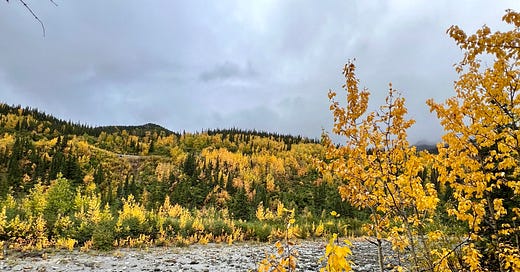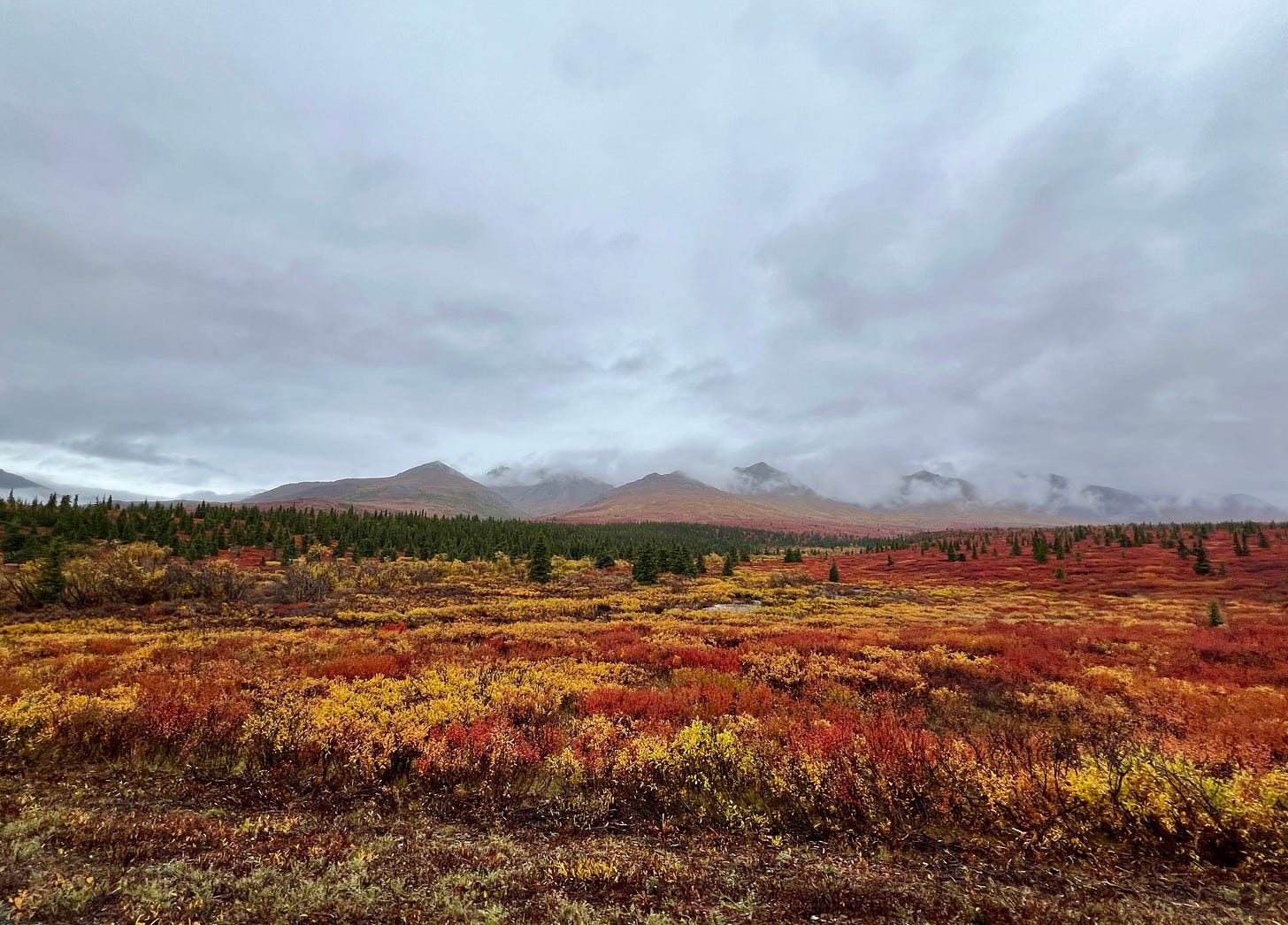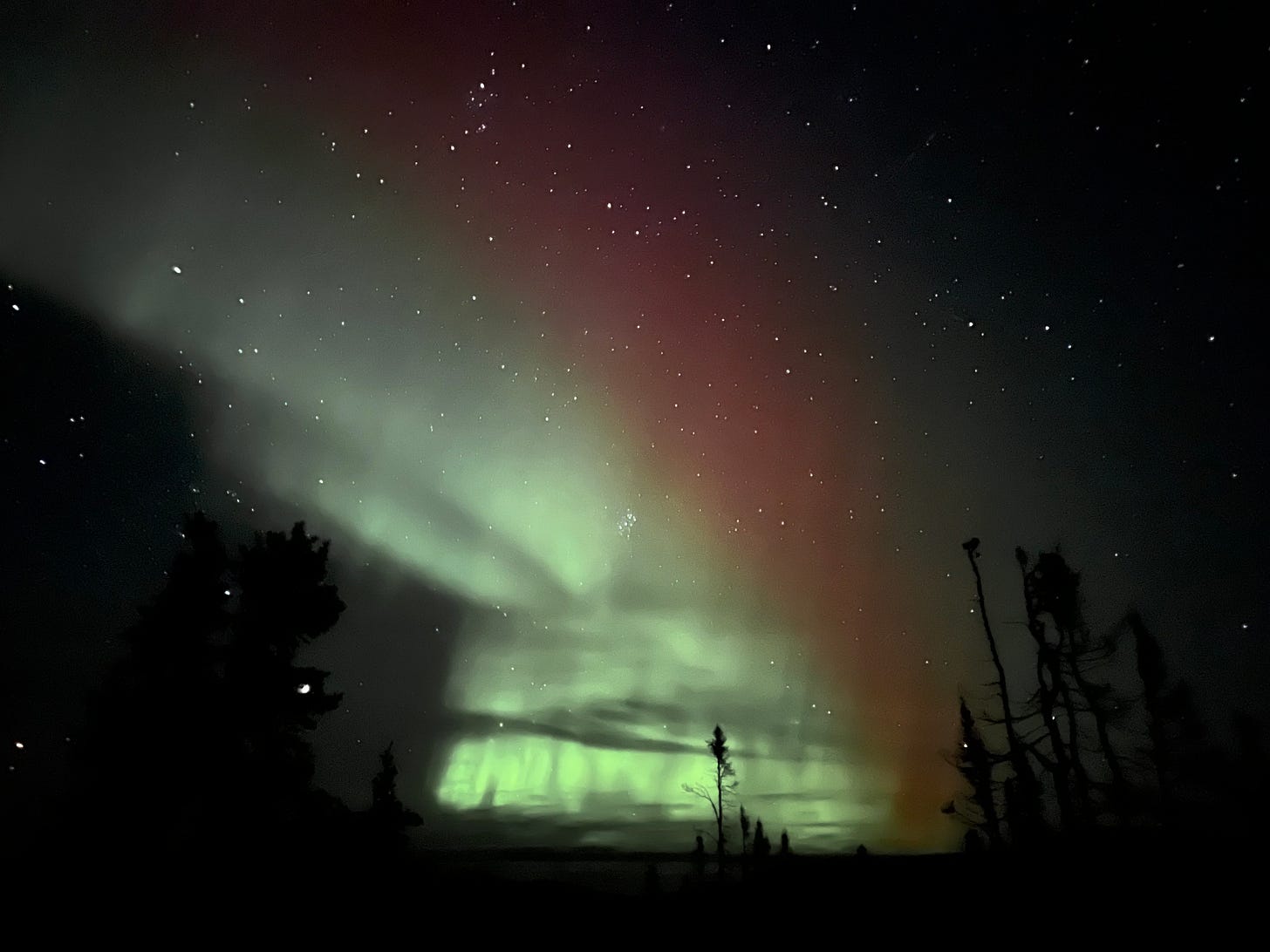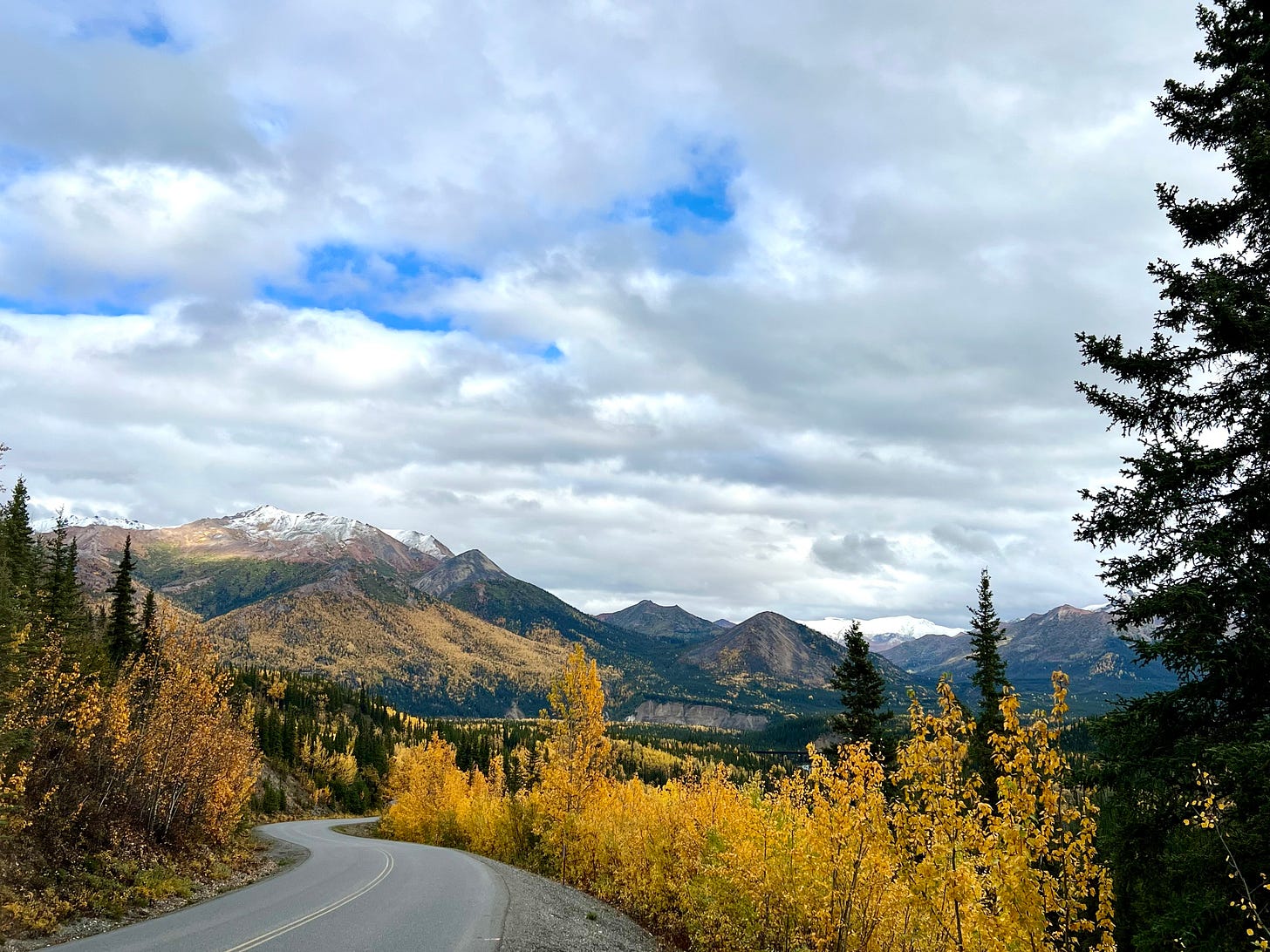Noticing & Naming: A Monthly Practice
Alaskan autumn, the good and bad in everything, and when it's all a lot
September seemed like (at least) two months to me. In the first month, we took a trip to Vancouver and Alaska and celebrated a big birthday for Isaac (he turned twenty-five 😉), and in the second, I had multiple editing deadlines as we returned to regular rhythms.
The trip itself felt like multiple trips too. Perhaps it was because we experienced summer, fall, and early winter within the span of two weeks, or because Alaska has so many different ecosystems that it doesn’t seem possible one place can contain them all. From glaciers to rainforests and mountains to fjords, Alaska is filled with such beauty and wonder that I haven’t found words for most of our experiences yet. But in an effort to practice living attentively, today I’m sharing five things I noticed, three things I named, and three questions to help you reflect on September (or last week or whatever seems helpful). I hope this gives you a little more language to notice and name the often hidden, but deeply true, things in your life.

Five Things I Noticed
I’m trying to pay attention to the world around me and to the details of my days. Sometimes these observations may lead to bigger realizations, but other times, the act of noticing is enough. Here are five things I noticed in September:
I noticed I felt energized when talking to other people about writing.
Since reading my friend Jenna’s essay on lüften, the German practice of airing out your home each day, I noticed I’ve been much more intentional about opening up our windows.
September held a handful of milestones and anniversaries, some sweet, some deeply bitter. I noticed that grief showed up as irritability, sadness, anger, and a short attention span. But I also noticed softer days filled with light. I can’t say that I welcomed all the emotions, but I did my best not to kick them out.
I noticed that any time spent on our deck made things feel a little lighter. Reading, working, eating meals outside—if Kansas is going to give me sunshine and a cool breeze, I plan to make the most of it.
I noticed that the colors in Alaska brought me joy. There was so much to absorb: fields blazing with red underbrush; aspens so yellow they looked luminescent against the overcast sky; bold teal water lapping against the side of spires; red, yellow, evergreen, and sage winding their way up the mountain sides until they disappeared into low-hanging clouds. It was peaceful, contemplative, and moody in all the right ways.
Three Things I Named
I have a loud internal life, and naming what’s going on the inside helps to quiet things down. When we can put thoughts and emotions into words, fear begins to lose its power, next steps come into focus, and we realize we’re not actually alone. Here are three things I named last month:
1. There’s good and bad in everything.
This truth keeps circling in my mind recently, and our trip was a prime example. Alaska held stunning landscapes, lots of laughs, and unforgettable experiences like hiking and zip lining in Denali National Park. And it held rain, long waits, canceled plans, and lots of time in the car. Isaac’s birthday was in the middle of the trip, and when we tried to go out to a celebratory dinner, we encountered a food truck that didn’t show up, a closed restaurant, and a place that locked the door behind us (at 7:30 p.m.) and then said they couldn’t seat us because they were out of, well, almost everything. (Welcome to Alaska?) So dinner consisted of veggie sandwiches and chips in the car. Not what we had in mind, to say the least.
But after days of nearly constant cloud cover, the skies cleared and revealed the night’s headliner: the northern lights. We spent most of the night on a hilltop, training our eyes to recognize the dancing lights and trying to capture them on our phones. We warmed up with tea and hot chocolate in a nearby yurt and then headed back into the star-speckled darkness. Some time after 5 a.m, we finally collapsed in bed, exhausted but happy.
I keep wondering how accepting (and even embracing?) the idea that everything has both good and bad in it might free me up. I suspect it would cause decision-making to feel lighter and turn foiled plans into funny stories a bit faster. Yes, sometimes you’ll be disappointed and hangry and end up eating sandwiches in the car on your birthday. But you might also get to see the sky put on a show.
2. This is a lot, and I don’t know what to do with it.
By this I mean both things happening in my life and tragedies in the wider world. Trying to hold everything from work deadlines and grief anniversaries to the devastation of Helene, the headlines about the Middle East, and now the threat of Milton is too much. I’m scrolling more than I want to. I’ve had a hard time focusing. I want to write about beauty but I wonder if it matters. There are some things we can do to help, but it all feels so small, so inadequate. And it may be. But as
says, “We do what we can, not what we can’t.” She put words to some of the things I’ve been feeling in this recent post about Hurricane Helene where she says:“If we are not one of those directly impacted by tragedy (whether it be a natural disaster like this one or something else terrible), it can be easy to think we ‘should’ be able to get things done as usual: to be productive and tackle that to-do list and be our regular selves. But holding a human awareness of struggle and being people who allow our hearts to break open to it means we will not be able to do our work with the same level of clarity and energy as before. This is as it should be. There is nothing wrong with you if you feel distracted, sad, and aimless. Don’t let your distraction shame you. Let it be a reminder that this is what it feels like to care. . . . We do what we can, not what we can’t. We can’t change the situation, restore power to entire communities, or make all of this go away. But we can support those who can. We can always do one small next right thing.”
This world holds so much extravagant beauty and such searing pain. Most of the time, I don’t know what to do with that fact. Sometimes it feels overwhelming. Sometimes it feels motivating. Sometimes I feel numb to it all. Regardless, I think it’s important to name when it feels like a lot because this is what it feels like to care. So we do what we can—to help, to love our neighbors, to care for ourselves. It is a lot, and you can’t hold it all. But you’re not the only one who feels that way and you’re not alone. That’s worth naming too.
3. Nine times out of ten, getting outside and/or moving my body helps (at least a little).
Whether I’m feeling anxious or angry, lethargic or indecisive, getting outside brings me back to the present, and moving my body quiets down my nervous system and my mind. These things are a calming, clarifying type of self-care. Choosing to sit outside, go for a walk, or work out for thirty minutes can sometimes feels like a herculean effort, but I’m always glad for having done it.
Questions for Your Practice
Where could the idea of everything having both good and bad in it give you a little more freedom?
Does anything feel heavy or overwhelming right now? If so, can you name it and how it’s impacting you? You can’t do everything, but what’s one small thing that is in your control?
What’s one habit that’s calming and clarifying for you? Can you do that thing this week?
Words That Resonated
In an effort to give us more language for our lives, here are three quotes that stuck with me last month.
“Grief is not a problem to be solved; it’s an experience to be carried. The work here is to find—and receive—support and comfort that helps you live with your reality. Companionship, not correction, is the way forward.” —Megan Devine, It’s OK That You’re Not OK
“Communities are where the spirit does the deep work of evolution, away from small and superior, to deeper and messier and more alive.” —Anne Lamott, Somehow
“The people who I most respect are those who have suffered but did not numb their pain—who faced their darkness. In the process they have become beautifully weak, not tough as nails, not bitter or rigid, but men and women who bear vulnerability with joy and trust. They are almost luminescent, like a paper lantern, weak enough that light shines through.” —Tish Harrison Warren, Prayer in the Night
Thanks for reading. In this with you as we pay attention to our lives, name what’s true, and tend to what needs our care.
The links to books are affiliate links, so I’ll receive a small commission if you end up purchasing any of them. Whether you buy them or find them at the library, all of these are well worth the read!











Amazing. You arrange ordinary words in such an amazing way! I can relate. I wonder, “How did you know how I feel?” And, I am blessed to know you a little more, as you share your heart. ❤️
Love you, and I loved our time over coffee together recently…sitting and recognizing what’s hard or unfair, while also celebrating what we can!